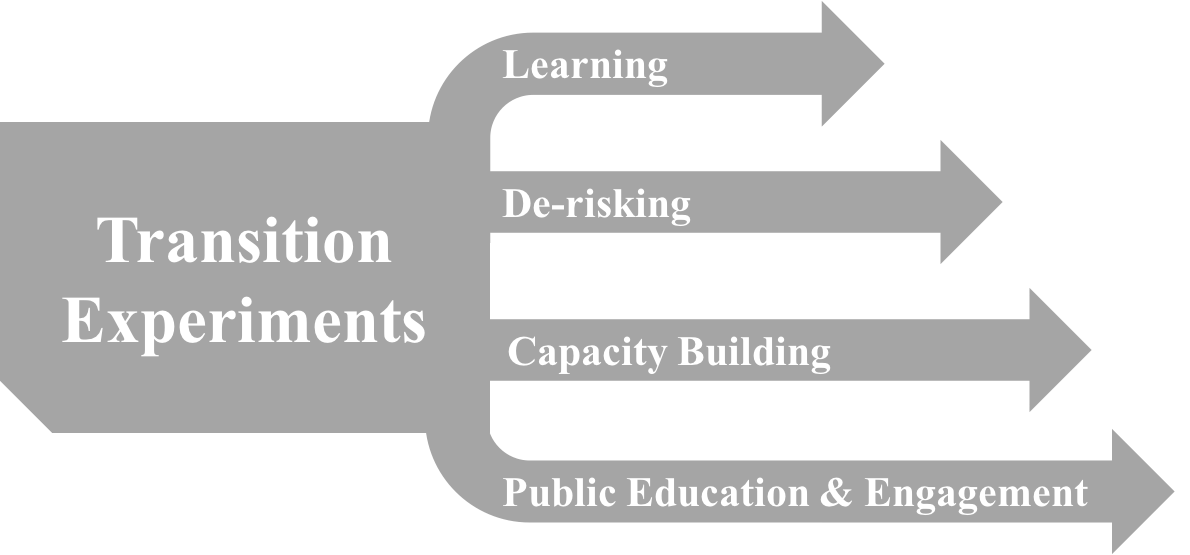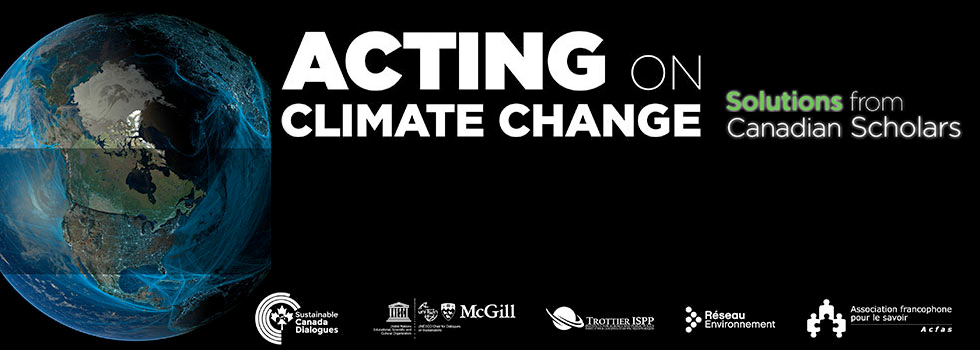Work in Progress
Quick Access to Subsections:
→Background
→A Framework to Evaluate Low-Carbon Transition Learning Projects
→International Examples of Transition Experiments
→Partners
Acting on Climate Change: Indigenous Innovations
Indigenous Innovations aims to give visibility to existing, successful Indigenous climate and sustainability initiatives across Canada. It is a participatory project that seeks to forward cross-cultural learning on climate change mitigation and adaptation that makes meaningful progress towards Reconciliation in Canada, recognizing the leadership of Indigenous cultures with respect to sustainability as a key element of their relationship with the environment. Click on the logo below to find out more!
Experimentation and the low-carbon energy transition
Background
Generation Energy Report (2017)
In the context of Generation Energy, Natural Resources Canada (NRCan) asked Sustainable Canada Dialogues to examine how Canada can transition its energy systems to low-carbon configurations while remaining globally competitive. The resulting report, Re-Energizing Canada: Pathways to a Low-Carbon Future, offers specific recommendations on how to make the low-carbon energy transition.
Low-Carbon Energy Transition Experiments
One of the scholars' key recommendations for immediate action is to carry out low-carbon energy transition experiments. These experiments should involve a diverse set of innovative social practices and technologies and should be carried out across Canada. Transition experiments are defined as deliberate interventions led by innovators (e.g., provinces, Indigenous nations, on-the-ground businesses, municipalities, non-profit organizations, universities) to instigate learning cycles from innovation design to implementation, evaluation and readjustment. As the chances of failure increase with the degree of innovation, we stress the importance of policies that support testing, while recognizing that some degree of failure is expected. Knowledge gained from both successes and failures can be put to good use.

Generation Energy Forum Side Event
The Generation Energy Forum took place in Winnipeg from October 11–12, 2017, which concluded a summer of dialogues with Canadian citizens on their visions for Canada’s energy future.
At the Generation Energy Forum, Sustainable Canada Dialogues hosted a side event to assess cross-sector interest in establishing a network of transition experiments across Canada. The practitioners invited to participate included three Indigenous nations, six industry and seven civil society representatives and one federal MP. For participants, a key value of experimentation is that it de-risks the energy transition, reducing risk for both public and private sector actors and thereby encouraging transformative innovation.
A Framework to Evaluate Low-Carbon Transition Learning Projects
Over Summer 2018, Sustainable Canada Dialogues developed a framework to evaluate socio-technical energy "Transition Learning Projects". What distinguishes the proposed Transition Learning Projects from current innovations is an explicit orientation to evaluate project experiences, extract and share lessons learned and inform subsequent decision-making. A common framework to evaluate Transition Learning Projects is therefore a key component of accelerating the low-carbon energy transition.
The internal report submitted to NRCan synthesizes the literature on low-carbon energy transitions and their evaluation. It then proposes an evaluation framework developed and enriched by discussions and exchanges that took place at a one-day working session held in Ottawa on June 1, 2018, when SCD invited a group of experts with relevant experience from the private, NGO and public sectors to begin co-developing a holistic approach for evaluating socio-technical energy Transition Learning Projects. The proposed evaluation framework is illustrated by three case studies and benefited from several rounds of feedback from practitioners, federal civil servants and scholars.
International Examples of Transition Experiments
Daniel Rosenbloom and Sustainable Canada Dialogues scholar James Meadowcroft produced a thought paper to further develop the idea of transition experiments. They analysed international experiences to inform the design of a program of transition experiments in Canada that could encourage similarly bold and potentially transformative projects to accelerate the low-carbon energy transition. Below we present some international examples reviewed in their paper, as well as a final additional example.
See: Rosenbloom, D., and Meadowcroft, J. (2017). Transition experiments: Unlocking low-carbon transition pathways for Canada through innovation and learning, and Rosenbloom, D., Meadowcroft, J., Sheppard, S., Burch, S., and Williams, S. (2018). Transition Experiments: Opening Up Low-Carbon Transition Pathways for Canada through Innovation and Learning. Canadian Public Policy, 44(4): 368–383.
Rotterdam’s floating port experiment
“Built as a possible model to address rising sea levels more broadly, floating pavilions were designed in Rotterdam to be self-sufficient, supporting agricultural activities and energy production as well as housing residential and commercial buildings (Frantzeskaki et al., 2014). This experiment allowed the diverse project teams to gain experience with various dimensions of energy transitions and build momentum by establishing lasting contacts.”
Frantzeskaki, N., Wittmayer, J., Loorbach, D., 2014. The role of partnerships in ‘realising’ urban sustainability in Rotterdam’s City Ports Area, The Netherlands. J. Clean. Prod. 65, 406–417. doi:10.1016/j.jclepro.2013.09.023

Social housing in Ljubljana, Slovenia
“Low-carbon energy retrofits for social housing in Ljubljana, Slovenia, confront both climate change and energy poverty (Castán Broto, 2012). Through an active public engagement and information dissemination campaign, this initiative has raised awareness about poor energy performance and associated comfort, health, and climate change issues in local communities. This illustrates how engagement with diverse societal actors helps to build credibility for alternative low-carbon configurations and legitimacy for the overarching low-carbon energy transition (Späth and Rohracher, 2012).”
Castán Broto, V., 2012. Social housing and low carbon transitions in Ljubljana, Slovenia. Environ. Innov. Soc. Transit. 2, 82–97. doi:10.1016/j.eist.2012.01.001
Späth, P., Rohracher, H., 2012. Local demonstrations for global transitions—Dynamics across governance levels fostering socio-technical regime change towards sustainability. Eur. Plan. Stud. 20, 461–479. doi:10.1080/09654313.2012.651800
Smart Kalasatama in Finland
“Smart Kalasatama is an emerging brownfield development in Helsinki, Finland, that will serve as an experimental innovation platform to co-create smart and clean urban infrastructure and services. The community is being developed through partnerships with residents, city officials, researchers, and businesses. By 2035, the development is expected to have approximately 25,000 residents and employ roughly 10,000.”
Source: Matschoss, K., Heiskanen, E., 2017. Making it experimental in several ways: The work of intermediaries in raising the ambition level in local climate initiatives. J. Clean. Prod. doi:10.1016/j.jclepro.2017.03.037
Greenhouses as an energy source in The Netherlands
“To explore possibilities for disruptive innovation, the Dutch Ministry of Agriculture established the InnovationNetwork (a quasi-governmental intermediary). The network convened a group of actors to develop a vision for the future of greenhouse horticulture systems. As part of this, greenhouses were redefined as giant solar collectors rather than as massive energy sinks. In partnership with a local horticulturist, a pilot project was carried out in 2006 to demonstrate and learn about this new model. For instance, in the energy producing greenhouse model, greenhouses: use waste heat to meet demand at neighbouring buildings (a nursing home in one case); have entered into agreements to purchase CO2 from industry (chemical plants and refineries); and, serve as the centre of self-sufficient developments (Regen Village in Almere, The Netherlands).”
Sources: Elzen, B., van Mierlo, B., Leeuwis, C., 2012. Anchoring of innovations: Assessing Dutch efforts to harvest energy from glasshouses. Environ. Innov. Soc. Transit. 5, 1–18. doi:10.1016/j.eist.2012.10.006
Termeer, C.J., Dewulf, A., 2012. Towards theoretical multiplicity for the governance of transitions: the energy-producing greenhouse case. Int. J. Sustain. Dev. 15, 37–53.
Innovative housing retrofit program in the Netherlands
In what began as a government-funded programme, an Energiesprong renovation (or new built) is financed in two ways: through energy cost savings from tenants and by reduced maintenance and repair costs for housing associations. The objective is for tenants to have the same monthly expenses—they pay the housing association for an energy service plan instead of an energy supplier bill. The housing association can now use this new income stream to pay for the renovation. Sustainable Building Canada is trying to bring this approach to Canada.
Partners
We are currently working with a range of partners across the country to discuss the potential to establish a network of transition experiments that will accelerate the low-carbon energy transition. Click below to see what some of our partners are currently up to:
Canadian Museum for Human Rights
Conseil des Innu de Ekuanitshit
Environmental & Corporate Initiatives, City of Saskatoon
Ministry of Communities, Land and Environment, Province of Prince Edward Island
Pacific Institute for Climate Solutions
QUEST—Quality Urban Energy Systems of Tomorrow
Solid Waste Management Services, City of Toronto







